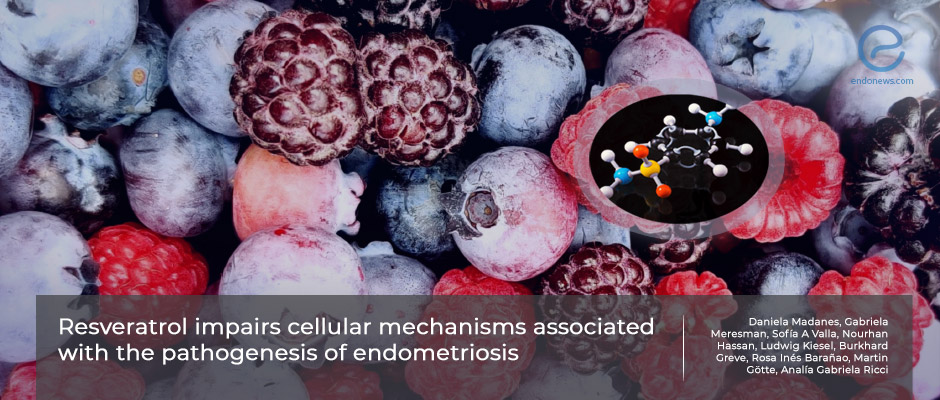The effects of resveratrol on endometriotic cells
Sep 9, 2022
Shown to have roles in many pathways in endometriosis development, resveratrol may serve as a potential therapeutic agent
Key Points
Highlight:
- Resveratrol as a natural polyphenol might have promising effects on endometriosis by interfering with many mechanisms in the disease pathogenesis.
Importance:
- Resveratrol decreased cell viability and induced apoptosis in vitro, promising its use as a potential therapeutic agent in endometriosis.
What is done here:
- This study aimed to understand the effects of resveratrol on different pathways of endometriosis development.
- Primary endometriotic stromal cells of 5 patients were used to isolate the immortalized endometriotic epithelial-like (named 12Z) and the human endometrial stromal cell line (named St-T1b).
- Cell viability, apoptosis, migration, stem cell function, and angiogenesis were examined by using a variety of techniques.
Key results:
- Resveratrol decreased cell viability in cell lines after 48 hours.
- It induced apoptosis by cleaving caspase-3 protein levels and inhibited cell migration.
- It regulated the expression of genes related to cell migration and angiogenesis by causing a significant downregulation of VEGF and Ang-1 mRNA levels.
- It also altered the expression of stem cell markers.
Strengths and Limitations:
- This is the first report evaluating these resveratrol effects in an endometriotic cell line.
- Limitations include the results being largely obtained with immortalized cell models and the effect of resveratrol being assessed only on endometriotic cells.
Lay Summary
The current treatment methods for endometriosis still carry recurrence risks and side effects from medications. Herbal medicine has been investigated and used as an additional alternative method.
Derived from several plants and found in some dietary sources, resveratrol is a natural polyphenol. It has many features such as anti-carcinogenic, anti-inflammatory, antioxidant, and pro-apoptotic. The exact molecular mechanism however is yet to be known. Its role in inhibiting angiogenesis has also been a subject of cancer research and its use in endometriosis is also being investigated.
Madanes et. al conducted a study to understand the role of resveratrol on several mechanisms involved in the development of endometriosis including proliferation, apoptosis, migration, angiogenesis, and stem cell type. The study was published in the June 2022 issue of the journal Reproductive Biomedicine Online.
Primary endometriotic stromal cells of 5 endometriosis patients were obtained from biopsies, and the isolation of immortalized cell lines was then performed (epithelial-like:12Z and stromal cell line St-T1b). Cell viability assay, wound healing assay, Annexin V assay and flow cytometry, Western blotting, RNA isolation and reverse transcription, and quantitative RT-PCR were applied.
Results showed that resveratrol decreased cell viability in the studied cell lines after 48 hours, and it induced apoptosis which was detected as an increase in the percentage of apoptotic cells. Cleaved caspase-3 protein levels were also increased proving the effect on apoptosis once more in epithelial endometriotic and stromal endometrial cell lines. The authors stated that cleavage of caspase-3 might be one of the mechanisms in which resveratrol induces apoptosis. The inhibition of cell migration was also observed after resveratrol application. This was shown more in detail as it was seen that resveratrol regulated the expression of genes related to cell migration and angiogenesis by causing a significant downregulation of VEGF and Ang-1 mRNA levels. When the aberrant stem cell function was investigated, it was seen that resveratrol altered the expression of stem cell markers.
To conclude, the authors declared that understanding the effect mechanisms of resveratrol is important in defining its use as a potential therapeutic agent, and this study encourages more research on resveratrol as a novel agent.
Research Source: https://pubmed.ncbi.nlm.nih.gov/35361545/
endometriosis resveratrol therapeutic apoptosis caspase inflammation migrattion angiogenesis stem cell

